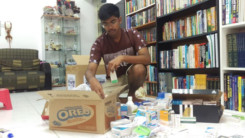
Dubai
The basic needs of mankind are food, clothing and shelter. But today, even medicines have a place in this list and it is alarming how many medicines go to waste on a daily basis. I decided it was time to do something about it.
I have noticed that pharmacies always give a full box of medicine. Out of a strip of 12 tablets, we might need to use only four or six for the ailment, as prescribed. We store the remaining medicines on shelves, where they lie until we discover that they have expired.
According to the ‘Guidelines and Minimum Standards for Good Pharmacy Practice in UAE Pharmacies’ published by the Ministry of Health’s Drug Control Department, medicines must be sold as original packs. The strip should not be cut and given separately, as this can lead to the loss of the batch number. If, in any circumstance, partial packs are required, they must carry the medicine name, batch number and expiry date and the patient must receive a copy of the original package insert.
Wastage of medicine not only leads to abuse of medical insurance claims but as an environmentalist, I find that improper disposal of excess medicine poses a serious threat to the environment and disrupts local ecosystems.
Another issue, which was highlighted by a World Health Organisation report, is that from 1985 to 1999, the value of medicine production grew four times more rapidly than the world’s income and the number of people without access to medication is about 1.7 billion.
One solution to this problem is to prescribe and supply medicines only according to what is needed and not what is wanted. A good alternative to this is a program where pharmacies and hospitals take back excess medicine.
In February 2013, the Dubai Health Authority (DHA) announced the launch of its “Clean Your Medicine Cabinet” campaign. As part of the campaign, the public was able to drop off expired or unutilised medication at all DHA pharmacies.
Another solution to this is to donate the surplus to a hospital where it can be offered to patients in need. An organisation in Ajman by the name of Al Ihsan Charity Association does exactly this. Through my Share N Care Library, I initiated a collection drive that collected leftover and unused medicines otherwise destined for landfills, and donated it to the hospital so that they could check the validity of the medication and eventually give it to patients free of cost.
The first medicine collection and redistribution drive during the month of Ramadan 2016 collected over 50 kilograms of medicines in one month, which included medicines in liquid form, tablets and capsules. We have now initiated the second medicine drive, from November 21 to December 25, 2016. In the first week itself, the collection crossed about 20 kilograms and a lot of people contacted the library to drop off medicines. Some individuals even took up the task of collecting from their contacts and giving it to the library. All the medicine collected will once again be handed over to the Al Ihsan Charity Association.
Those who wish to contribute to the medicine donation drive can contact the library at sharencarelibrary@yahoo.com.
— The reader is a student based in Dubai.
Be a community reporter. Send us your videos and pictures at readers@gulfnews.com








